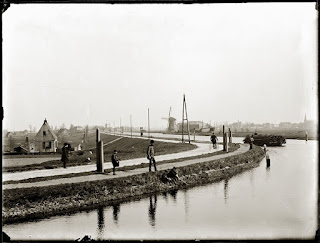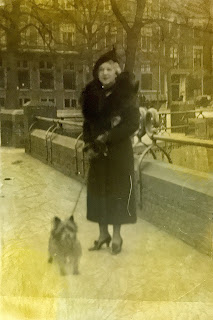Family Legend
Week 33 - Family Legend. It isn't unusual for a family to have some sort of legend. Maybe it's a legend surrounding the family's arrival in a country or that there's an ancestral castle waiting to be claimed. Maybe it's a story about how you're supposedly related to someone famous. You could explore how you proved or disproved the story. Then there are the "tall tales" that seem to get taller at every telling!
Another way you could look at this prompt is someone who did something legendary or was considered a legend in their line of work or in their community. How are you going to interpret "family legend"?
Henri Wilhelm August Deterding (1866-1939) is my choice for this week 33 prompt - Legend. He qualifies because in his life time he was called a Dutch oil king or The Napoleon of oil (Source: Henri Deterding, Wikipedia and NY Times, Dec 29, 1929 - An Oil King Who Came out of the East)
We are not related in a direct line. He is my third cousin twice removed but our common shared ancestor is Maria Adelheid (Maartje) Bronke, who was his great-great grandmother and my 5X great-grandmother. I wrote about her in week 31 - Oldest.
A lot has been written about Deterding and it makes for interesting reading. I don't want to reproduce here what can be found about him just by a Google search, but I do want to highlight some things that I particularly noticed, or that interested me.
Henri Deterding, or I should say, Sir Henri Deterding, was one of the first executives of the Koninklijke Nederlandsche Petroleum Maatschappij (KNPM) - Royal Dutch Petroleum Company, later to merge with the Shell Transport and Trading Company of the United Kingdom in 1907 to become Royal Dutch Shell. He was the driving force of the European coalition which took on the monopoly of the American oil company Standard Oil (Esso).
He was made a honorary Knight of the British Empire - (KBE (Hon.) in 1920 and in 1928 the Technische Hogeschool Delft (Technical University Delft) appointed him doctor honoris causa in technical sciences.
Quite an achievement for someone who completed only the three-year HBS (higher civil school) before starting work in August 1882 as the youngest office clerk with the Twentsche Bankvereeniging (Twentse Bank Association) Amsterdam, where he received all-round training in commerce and stood out for his extraordinary abilities in arithmetic.
In September 1888 he applied successfully for a position at the Nederlandsche Handel Maatschappij (NHM) - Dutch Trading Society - and later that year was sent out to the Dutch East Indies, and posted to Medan, Sumatra, to unravel their muddled bookkeeping. This took just a few months and thus he made his reputation.
In 1891, Deterding was appointed sub-agent of NHM on the island of Penang. This is our second connection because my father was appointed to the NHM post in Penang in 1960.
As agent for the NHM in Penang, Deterding got to know J B August Kessler, who was commissioned by the KNPM to exploit the oil concessions on Sumatra's east coast. In 1894 Kessler got in cashflow difficulties and it was Deterding, after careful scrutiny of Kessler's calculations, who committed the NHM to invest in the new venture. Eventually this led to Deterding being employed by Kessler and the KNPM and in 1897 Deterding brought his family back to the Hague, where he became the bookkeeper in the small office of the KNPM. Production and financial difficulties finally took their toll on Kessler who died in 1900, having recommended Deterding to be his successor as Director of KNPM.
In his role as Director of KNPM Deterding pursued his plan to curtail the monopoly of Standard Oil and he could only do this through an alliance of European oil producers. This is how finally the union with Shell came into being - to cut a very long and detailed story short.
One difficult issue is Deterding's Nazi sympathies, which depending on what source one reads, range from sympathy and admiration for Hitler's industrial and economic achievements to fanatical Nazism, anti-semitism and being a close confidante and friend of the Führer. I won't attempt to reconcile this, but it is a dark side to a man who from what I have read seems quite likeable and admirable even.
A classic puritan in outlook, with a strong work ethic, he was a disciplined sportsman, swimming every day before breakfast, even in winter, and sober of habit. He was known for his encyclopaedic knowledge of the oil industry, and the Shell company, earning the nickname "Hij Weet Alles" (He knows all) an acronym from his initials, though he was not a know-all and was open to new ideas or opinions.
Though no academic, he was interested in art and donated generously. Thanks to him the Maurits Huis Museum in The Hague and the Rijks Museum in Amsterdam have some important pieces in their collection. (Source: Paul A. Hendrix, Deterding, Henri Wilhelm August (1866-1939, in Biografisch Woordenboek van Nederland).
In the family history there is a simple note from a cousin on the Bronke side of the family: "this Deterding was married three times. Details known". Nothing about him being possibly the most powerful man in the world as he was called in the book of the same title by Glyn Roberts, published in 1938. (The Most Powerful Man in the World, the life of Sir Henry Deterding, by Glyn Roberts, 1938. New York COVICI Friede Publishers).
This is family history so to finish this story, some words about his family life. His first wife was Catharina Louise Neubronner, whom he married in 1894 in Penang and they had two sons - Ronald Frits and Henry and two daughters - Adolphine Alberta and Henrietta. After Catharina died in 1916, he married Lydia Pawlowna Koudoyaroff, the daughter of a Russian general, and two more daughters were born, Lydia and Olga. They divorced in 1933 and in 1936 he married Charlotte Minna Knaack with whom he had a further two daughters, Luise and Henriette. There are no further descendants it seems.
Another way you could look at this prompt is someone who did something legendary or was considered a legend in their line of work or in their community. How are you going to interpret "family legend"?
 |
| Henri Wilhelm August Deterding, KBE (Hon) Nationaal Archief , Public Domain |
We are not related in a direct line. He is my third cousin twice removed but our common shared ancestor is Maria Adelheid (Maartje) Bronke, who was his great-great grandmother and my 5X great-grandmother. I wrote about her in week 31 - Oldest.
A lot has been written about Deterding and it makes for interesting reading. I don't want to reproduce here what can be found about him just by a Google search, but I do want to highlight some things that I particularly noticed, or that interested me.
Henri Deterding, or I should say, Sir Henri Deterding, was one of the first executives of the Koninklijke Nederlandsche Petroleum Maatschappij (KNPM) - Royal Dutch Petroleum Company, later to merge with the Shell Transport and Trading Company of the United Kingdom in 1907 to become Royal Dutch Shell. He was the driving force of the European coalition which took on the monopoly of the American oil company Standard Oil (Esso).
He was made a honorary Knight of the British Empire - (KBE (Hon.) in 1920 and in 1928 the Technische Hogeschool Delft (Technical University Delft) appointed him doctor honoris causa in technical sciences.
Quite an achievement for someone who completed only the three-year HBS (higher civil school) before starting work in August 1882 as the youngest office clerk with the Twentsche Bankvereeniging (Twentse Bank Association) Amsterdam, where he received all-round training in commerce and stood out for his extraordinary abilities in arithmetic.
In September 1888 he applied successfully for a position at the Nederlandsche Handel Maatschappij (NHM) - Dutch Trading Society - and later that year was sent out to the Dutch East Indies, and posted to Medan, Sumatra, to unravel their muddled bookkeeping. This took just a few months and thus he made his reputation.
In 1891, Deterding was appointed sub-agent of NHM on the island of Penang. This is our second connection because my father was appointed to the NHM post in Penang in 1960.
As agent for the NHM in Penang, Deterding got to know J B August Kessler, who was commissioned by the KNPM to exploit the oil concessions on Sumatra's east coast. In 1894 Kessler got in cashflow difficulties and it was Deterding, after careful scrutiny of Kessler's calculations, who committed the NHM to invest in the new venture. Eventually this led to Deterding being employed by Kessler and the KNPM and in 1897 Deterding brought his family back to the Hague, where he became the bookkeeper in the small office of the KNPM. Production and financial difficulties finally took their toll on Kessler who died in 1900, having recommended Deterding to be his successor as Director of KNPM.
In his role as Director of KNPM Deterding pursued his plan to curtail the monopoly of Standard Oil and he could only do this through an alliance of European oil producers. This is how finally the union with Shell came into being - to cut a very long and detailed story short.
One difficult issue is Deterding's Nazi sympathies, which depending on what source one reads, range from sympathy and admiration for Hitler's industrial and economic achievements to fanatical Nazism, anti-semitism and being a close confidante and friend of the Führer. I won't attempt to reconcile this, but it is a dark side to a man who from what I have read seems quite likeable and admirable even.
A classic puritan in outlook, with a strong work ethic, he was a disciplined sportsman, swimming every day before breakfast, even in winter, and sober of habit. He was known for his encyclopaedic knowledge of the oil industry, and the Shell company, earning the nickname "Hij Weet Alles" (He knows all) an acronym from his initials, though he was not a know-all and was open to new ideas or opinions.
Though no academic, he was interested in art and donated generously. Thanks to him the Maurits Huis Museum in The Hague and the Rijks Museum in Amsterdam have some important pieces in their collection. (Source: Paul A. Hendrix, Deterding, Henri Wilhelm August (1866-1939, in Biografisch Woordenboek van Nederland).
In the family history there is a simple note from a cousin on the Bronke side of the family: "this Deterding was married three times. Details known". Nothing about him being possibly the most powerful man in the world as he was called in the book of the same title by Glyn Roberts, published in 1938. (The Most Powerful Man in the World, the life of Sir Henry Deterding, by Glyn Roberts, 1938. New York COVICI Friede Publishers).
This is family history so to finish this story, some words about his family life. His first wife was Catharina Louise Neubronner, whom he married in 1894 in Penang and they had two sons - Ronald Frits and Henry and two daughters - Adolphine Alberta and Henrietta. After Catharina died in 1916, he married Lydia Pawlowna Koudoyaroff, the daughter of a Russian general, and two more daughters were born, Lydia and Olga. They divorced in 1933 and in 1936 he married Charlotte Minna Knaack with whom he had a further two daughters, Luise and Henriette. There are no further descendants it seems.




Comments
Post a Comment